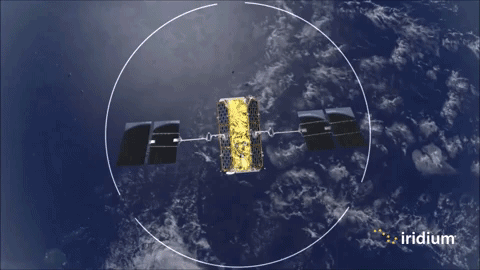News
Why Fairfax County is a Great Place for Iridium’s Headquarters: Interview with CEO Matt Desch

Tysons-based global telecommunications company Iridium’s location is ideal because of the proximity to their biggest customer – the Department of Defense, as well as the proliferation of other space-related companies in the region, according to Matt Desch, CEO, Iridium. In fact, Greater Washington is a “commercial space hub” in terms of the entire country, Desch noted in an interview with the Fairfax County Economic Development Authority during Iridium’s recent 25th anniversary celebration, held in November at Capital One Center in Tysons.

Matt Desch, CEO, Iridium Communications (Photo courtesy of Iridium)
With Iridium employees, the company’s original founders and early investors, partners, and distinguished guests gathered to mark the anniversary celebration, Desch said:
“We are excited to celebrate and reflect on the past 25 years while looking toward the future and leading new innovations in satellite communications. While our technology is still groundbreaking, it’s been the people in and around Iridium that have made the company the success that it is today.”
Originally located in Maryland, Desch said he decided to move Iridium’s headquarters to Tysons for several strategic business reasons.
“When I got here 16 years ago, Iridium was in Montgomery County, Maryland. As the company was going public, I wanted to move to what I believed to be the heart of the high-tech corridor, both for the growth that we would expect, the kind of employee capabilities that we would need, as well as all the partners that we could working with,” Desch explained.

Image courtesy of Iridium
“So, we moved the company over to Tysons just about the time we went public 13 years ago. We think this is a dynamic area. Our employees can get here from anywhere, whether they choose to live in major markets like D.C. or out in the country. We have great universities, we have high tech partners, and we have access to one of our largest customers here — the U.S. government,” Desch said. “So, it is a perfect nexus for our company, and many other space companies are in the area.”
With this proliferation of space and satellite communications companies, Greater Washington is a space communications hub, Desch said.
“Absolutely, it is. The rocket industry perhaps is more California-based and there are some governmental-type companies in California, But I would say D.C. is equally as strong an area. And a lot of that has to do with that the first and continuously largest investor in space is the U.S. government. So, it’ll always be a hub for the industry,” Desch said.
“But even though we’re primarily a commercial company, we benefit by being so close to the aerospace and defense industries that are in this area. Outside of these two areas, there’s some space hubs in Texas, and some places like Huntsville, Alabama, or the Space Coast in Florida,” he continued. “But I don’t know that there is as strong an area as D.C. is. I believe D.C. is possibly the Number One area for the satellite industry among other aspects of commercial space.”
And Greater Washington, D.C. is a good area for accessing talent for the company’s Northern Virginia locations, Desch emphasized.
“We don’t have a hard time attracting talent. We have grown quite a bit. We hired 200 people last year, and about 150 people as of today that have joined us this year. And for a company that has about 750 employees, around 50 percent located in the Greater D.C. area, that’s a major percentage of year-over-year growth,” he said.

Image courtesy of Iridium
“In Northern Virginia we get great employees who graduated from Virginia Tech, George Mason, American, Georgetown, or George Washington, among others. We are also getting a lot of other people with experience in the telecom industry and at high-tech companies.” Desch said.
Click here to find out about careers at Iridium.
“It is a growing, vibrant area. And people seem to want to move here if they’re not here already,” Desch said.
Click here to read a Q&A interview with Desch on his reflections on the satellite communications industry over the past 25 years, predictions for the future of telecommunications — and more.
News Travels Fast
Stay ahead of the curve with the latest business news from Northern Virginia. Receive updates on moves, incentives, workforce, events and more.